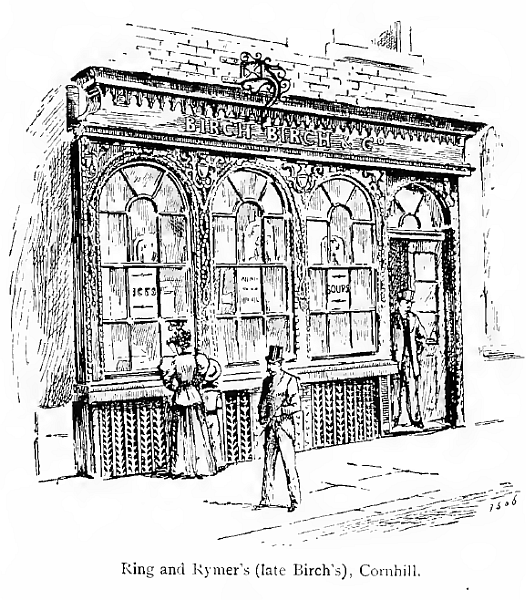

Search london history from Roman times to modern day
A historical site about early London coffee houses and taverns and will also link to my current pub history site and also the London street directory

Ring and Rymer's (late Birch's), Cornhill.
Retracing our steps to Cornhill, passing the Bank of England, and crossing
the flags between the front steps of the Royal Exchange and the Wellington
Statue, we find ourselves facing a very remarkable and interesting old
pastry-cook's shop, which still retains its old-world appearance, utterly
regardless of plate-glass and all modern improvements. This was the shop of the
late Alderman Birch, and it has a reputation extending over the whole civilized
world.
Mr. Birch and his successors, Messrs. Ring and Rymer, who continue to carry on
the business, have probably provided more civic feasts than any other firm. What
Gunter's is to the West End, this old-fashioned shop is, and has been for many
years, to the City. To this place are brought a very large proportion of those
delicious Chelonian reptiles, better known as turtles. Birch's turtle soup,
thick or clear, according to taste, is a dream. A City banquet without turtle
soup is a thing too dreadful to think of. It would be an unprecedented horror.
Ring and Rymer's (late Birch's), Cornhill.
Everything supplied at Birch's bears an indelible brand of A1. You can lunch
here in perfection and have dishes obtainable nowhere else. The prices, however,
are quite on a par with the quality.
One of the sights of the City is the spectacle to be witnessed every morning in
the old-fashioned shop the firm occupies. There, as regular as clockwork. City
men meet to discuss over a glass of wine, a maid of honour, or some other of the
delicious buns to be bought nowhere else, the latest market topic, or the
current Stock Exchange story.
During the lifetime of Alderman Birch he ordered the savoury contents of the
stock pots — the ingredients, in fact, " that cost the money," of which his
celebrated soups were so artistically concocted — to be taken on certain days of
the week to Whitecross Street Debtors' Prison, where they were distributed among
the poor and county court prisoners, to whom it was a most welcome addition to
the hard fare of the prison allowance to poor debtors.
This was continued up to the time of the abolition of Whitecross Street Prison,
and its place being occupied by the Midland Railway Company's goods station for
the City. It was generally believed that this charitable distribution of the
luscious contents of the stock pots had been devised to the poor by the will of
the good old alderman ; but such was not the fact. After the demolition of
Whitccross Prison, Messrs. Ring and Rymer for some time distributed the dainty
debris of fish — if turtle is a fish, — flesh, and fowl, to sundry poor people,
who came to their place first ; but after awhile the applicants came in such
crowds, and were so importunate at all sorts of inconvenient times and seasons,
as to interfere with business and become a nuisance. They were consequently
compelled to discontinue the good old custom. What now becomes of the " Savoury
Mess" this deponent knoweth not.
This would appear to be Birch, Birch & Co, a confectioners listed at 15 Cornhill
in the 1832 and 1842
street directories.
References :
Lots of references are made to two sources on the
internet archive
:
Edward Callows, Old London Taverns &
John Timbs, Club life of London Volume 2
Trying to avoid privacy and cookie settings overwriting content